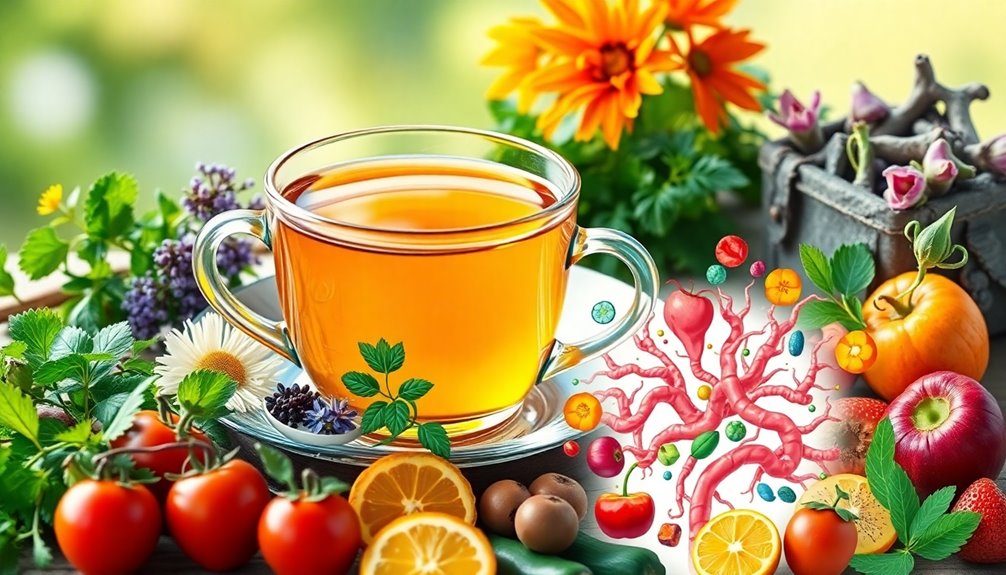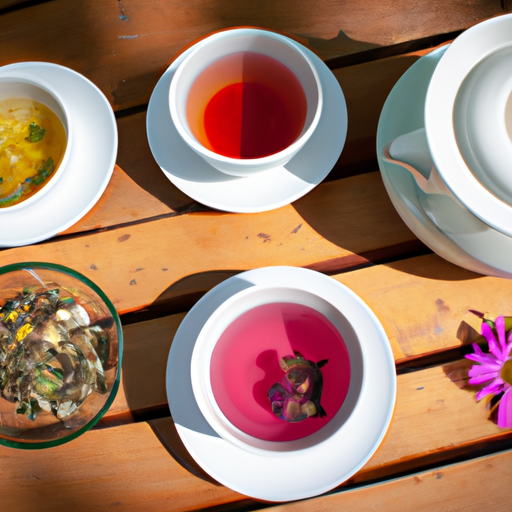Have you ever heard the saying, “Let food be your medicine”? I firmly believe the same principle applies to herbal tea. Throughout history, people have looked to nature for solutions to various health issues, and herbal tea has been a popular remedy for centuries. It’s truly remarkable how a simple combination of herbs and hot water can have such significant healing benefits for both the body and mind. In this article, I will delve into the world of herbal tea and explore the many advantages it offers for your health. From learning about the unique healing properties of different herbs to incorporating mindful tea drinking into your daily routine, I will take you on a journey towards achieving optimal well-being. So, grab your favorite mug and join me as we uncover the healing potential of herbal tea and how it can naturally aid in our wellness.
Key Takeaways
- Herbal tea has been used for centuries as a natural remedy for various ailments.
- Different herbs in herbal tea have unique properties and benefits.
- Choosing the right herbal tea is important for specific health concerns.
- Mindful tea rituals can enhance the experience of drinking herbal tea and promote relaxation.
Understanding the Health Benefits of Herbal Tea
To truly understand the health benefits of herbal tea, you’ve gotta sip it slowly and let its healing powers gently infuse your body. Researching the health benefits of herbal tea will open your eyes to a world of natural remedies and wellness.
Herbal teas have been used for centuries in various cultures for their medicinal properties. They offer a holistic approach to healing, addressing both physical and mental well-being.
Exploring different varieties of herbal tea can be an exciting journey. Each herb has its own unique properties and benefits. For example, chamomile tea is known for its calming effects, while ginger tea can help with digestion and nausea. Peppermint tea is great for soothing headaches and relieving stress.
By understanding the specific health benefits of each herbal tea variety, you can choose the ones that align with your needs and preferences.
Choosing the right herbal tea for your needs is a crucial step towards harnessing its healing powers. Whether you’re looking for relaxation, immune support, or relief from a specific ailment, there’s a herbal tea out there for you.
So, let’s dive into the world of herbal teas and discover the perfect brew to nurture your body and soul.
Choosing the Right Herbal Tea for Your Needs
When it comes to choosing the right herbal tea for your needs, there are a few key points to consider.
Firstly, it’s important to do your research on different herbal tea varieties to understand their unique health benefits.
Additionally, you should take into account your specific health concerns and choose a tea that targets those areas.
Lastly, don’t forget to explore the flavor profiles of different teas to find one that you enjoy and will want to incorporate into your daily routine.
Researching Different Herbal Tea Varieties
Explore the vast world of herbal tea varieties to find the perfect blend that’ll soothe your soul like a gentle melody.
There’s a wide range of herbal tea recipes available, each offering unique benefits for relaxation and overall well-being.
Chamomile tea, for example, is known for its calming properties, making it an excellent choice for those seeking relaxation after a long day.
On the other hand, lavender tea can help reduce anxiety and promote a sense of tranquility.
Peppermint tea is invigorating and can provide a burst of energy when needed.
By researching different herbal tea varieties, you can discover the ones that align with your preferences and health goals.
So, consider your specific health concerns, and let’s delve into the next section to find the perfect herbal tea blend that’ll address your needs.
Considering Your Specific Health Concerns
Discovering the perfect blend of herbal infusions can be a delightful journey, especially when you consider your specific health concerns and find the ideal tea to soothe your soul. Different herbal tea varieties have been used in traditional herbal tea remedies for centuries to address various health issues. By understanding the benefits and properties of each herb, you can choose the right tea to support your well-being. To make this process easier, I have compiled a table below highlighting some common herbal teas and their associated health benefits:
| Herbal Tea | Health Benefit |
|---|---|
| Chamomile | Promotes relaxation and sleep |
| Peppermint | Aids digestion and relieves gas |
| Ginger | Reduces nausea and inflammation |
| Echinacea | Boosts immune system |
| Lavender | Calms anxiety and promotes sleep |
By considering your specific health concerns, you can select the herbal teas that align with your needs. Now, let’s transition into the subsequent section and explore the exciting world of flavor profiles.
Exploring Flavor Profiles
Embark on a tantalizing journey of taste as you delve into the captivating world of flavor profiles in your quest for the perfect cup of soothing goodness. Herbal teas offer a wide range of flavor combinations that can be tailored to your specific health concerns. By understanding the unique properties of different herbs, you can create a harmonious blend that not only tastes great but also supports your well-being.
Here are three sub-lists to guide you in exploring flavor profiles:
-
Fruity and Floral: Try combining chamomile with lavender for a calming and floral infusion. For a refreshing and fruity twist, mix hibiscus with rosehips and orange peel.
-
Earthy and Spicy: For a warming and invigorating brew, blend ginger with turmeric and cinnamon. To add depth and richness, include licorice root or fennel seeds.
-
Citrus and Mint: Create a zesty and uplifting concoction by mixing lemon verbena with peppermint or spearmint. Add a touch of lemongrass for a bright and refreshing finish.
To fully enjoy the flavors and reap the healing benefits, it’s important to master the proper brewing techniques. Now, let’s explore how to prepare herbal tea for maximum healing benefits.
How to Prepare Herbal Tea for Maximum Healing Benefits
First, gather a variety of dried herbs and spices, as the combination of different ingredients in your herbal tea can maximize its healing benefits and create a tantalizing aroma. When preparing herbal blends, it’s important to consider the specific healing properties of each herb and how they can complement one another.
For example, chamomile can help with relaxation and sleep, while ginger can aid in digestion and reduce inflammation. Experiment with different combinations to find the blend that works best for you.
Once you have your herbs and spices, it’s time to brew your tea. Start by bringing water to a boil and then adding your herbs and spices. Let the mixture steep for about 5-10 minutes, depending on your preference for strength. Strain the tea and enjoy it hot or let it cool for a refreshing iced tea option.
Incorporating herbal tea into your daily routine can be as simple as replacing your usual cup of coffee or black tea with a cup of herbal goodness. The healing benefits of herbal tea aren’t just delicious but can also support your overall well-being. So, why not start your day with a soothing cup of herbal tea and experience the natural healing powers it has to offer?
Incorporating Herbal Tea into Your Daily Routine
One simple way to make herbal tea a part of your daily routine is by replacing your usual morning cup of coffee with a soothing and delicious alternative. Instead of reaching for that caffeine boost, try exploring herbal blends that can provide numerous health benefits.
Herbal teas are known for their healing properties and can be a great addition to your daily routine. Incorporating tea rituals into your day can also enhance the overall experience of drinking herbal tea. Taking a few moments to prepare and savor your cup of tea can help create a sense of mindfulness and relaxation. It can become a sacred ritual that allows you to slow down and appreciate the present moment.
To incorporate herbal tea into your daily routine, start by setting aside a specific time each day to enjoy your tea. Whether it’s in the morning to kickstart your day or in the evening to wind down, find a time that works best for you. Create a cozy and calming environment by finding a quiet space where you can fully immerse yourself in the experience.
By incorporating herbal tea into your daily routine and exploring different blends, you can reap the many benefits that herbal teas have to offer. The art of mindful tea drinking will be further explored in the subsequent section, highlighting the importance of being fully present and engaged while enjoying your cup of tea.
The Art of Mindful Tea Drinking
Discover the joy of savoring each sip of your favorite brew, allowing yourself to fully immerse in the art of mindful tea drinking. Mindful tea rituals have been practiced for centuries, not only as a way to enjoy the taste and aroma of herbal tea but also as a form of meditation and relaxation. By engaging in the art of tea meditation, you can cultivate a sense of calm and presence in the moment.
To begin your mindful tea drinking practice, start by selecting a quiet and comfortable space where you can fully focus on the experience. As you prepare your herbal tea, pay attention to the sound of the water boiling, the aroma of the herbs, and the warmth of the cup in your hands. Take a moment to appreciate the journey of the tea leaves from the earth to your mug.
Once your tea is ready, take a moment to observe the color and clarity of the brew. As you bring the cup to your lips, take a deep breath and savor the aroma. Slowly take small sips, allowing the flavors to dance on your taste buds. Notice the sensations in your mouth and throat as you swallow.
As you engage in mindful tea drinking, let go of any distractions and simply be present with each sip. Allow the tea to nourish not only your body but also your mind and spirit. By practicing the art of mindful tea drinking, you can create a space for relaxation and self-care in your daily routine.
Transitioning into the next section, exploring traditional and ancient herbal tea remedies, we can delve deeper into the healing powers of herbal teas and their potential benefits for overall well-being.
Exploring Traditional and Ancient Herbal Tea Remedies
In exploring traditional and ancient herbal tea remedies, I’m fascinated by the wealth of knowledge and wisdom passed down through different cultures.
Throughout history, herbal tea has been used for healing purposes, addressing a wide range of ailments and promoting overall well-being.
By delving into these historical uses, we can learn from centuries of wisdom and incorporate traditional remedies into our modern lives.
Traditional Herbal Tea Remedies from Different Cultures
Try incorporating traditional herbal tea remedies from different cultures into your healing routine to tap into the wisdom and healing power of diverse traditions.
Throughout history, various cultures have developed unique tea practices and remedies that have been passed down through generations. Here are three examples of traditional herbal tea remedies from different cultures:
-
Chinese Herbal Tea: Traditional Chinese Medicine (TCM) utilizes a wide range of herbs in tea form to address specific health concerns and promote overall well-being. For example, chrysanthemum tea is often consumed to improve eye health and relieve headaches.
-
Ayurvedic Herbal Tea: Ayurveda, an ancient Indian system of medicine, incorporates herbal teas for balancing the doshas (energies) in the body. Ginger tea is commonly used to aid digestion and reduce inflammation.
-
Moroccan Mint Tea: This refreshing tea is a staple in Moroccan culture and is known for its numerous health benefits. It is made with green tea, fresh mint leaves, and sugar, and is often enjoyed for its digestive properties.
By exploring these historical tea traditions and cultural tea practices, we can gain insight into the historical uses of herbal tea for healing.
Historical Uses of Herbal Tea for Healing
Throughout the ages, cultures around the world have harnessed the therapeutic properties of nature’s remedies, using them in various forms to alleviate ailments and promote overall well-being. Herbal tea, in particular, has played a significant role in historical healing practices across different societies.
From ancient China to indigenous tribes in the Americas, herbal teas have been used for their historical significance and cultural traditions. These remedies have been passed down from generation to generation, carrying with them centuries of wisdom.
The historical uses of herbal tea for healing are rooted in the belief that nature provides us with the tools to restore balance and harmony within our bodies. By learning from the past, we can tap into the wealth of knowledge and experience that has been accumulated over time, and continue to benefit from the healing power of herbal teas.
Learning from Centuries of Wisdom
By delving into the centuries of wisdom passed down through generations, you can unlock a treasure trove of knowledge on the incredible therapeutic properties of nature’s remedies.
Centuries old remedies, such as herbal tea, have been used in ancient healing practices for their holistic benefits. From boosting the immune system to reducing inflammation, herbal teas have proven their effectiveness time and time again. These remedies have stood the test of time and continue to be relied upon by millions. In fact, over 80% of the world’s population relies on traditional medicine for their primary healthcare needs.
Incorporating these ancient healing practices into our modern lives can bring balance and wellness. Transitioning into the subsequent section about tips for incorporating herbal tea into a balanced lifestyle, we can explore how to make the most of these remedies.
Tips for Incorporating Herbal Tea into a Balanced Lifestyle
When it comes to incorporating herbal tea into a balanced lifestyle, it’s important to find a harmony between other healthy habits.
By incorporating herbal tea into a routine that includes exercise, a nutritious diet, and adequate sleep, you can maximize the benefits of these practices.
Additionally, listening to your body and adjusting herbal tea consumption is key, as everyone’s needs and tolerances are different.
Lastly, it’s important to enjoy the benefits of herbal tea in moderation, as excessive consumption can have negative effects.
Balancing Herbal Tea with Other Healthy Habits
Incorporating herbal tea into your daily routine can help balance your overall health and wellness. Understanding the origins of tea and exploring different herbal tea blends can enhance the benefits you receive from this ancient healing practice.
Herbal teas are derived from plants with natural healing properties, such as chamomile for relaxation or peppermint for digestion. By incorporating these blends into your routine, you can support your body’s natural healing processes and promote overall well-being.
However, it’s important to listen to your body and adjust your herbal tea consumption accordingly. Pay attention to any changes in your body and how you feel after drinking herbal tea. This will help you determine the ideal amount and frequency that works best for you, ensuring that herbal tea continues to play a beneficial role in your balanced lifestyle.
Listening to Your Body and Adjusting Herbal Tea Consumption
Taking cues from my body’s reactions and adjusting my intake accordingly is key to optimizing the benefits of incorporating herbal tea into my daily routine.
When it comes to herbal tea consumption, it’s important to listen to my body and pay attention to any signals it may be giving me. If I notice that I’m experiencing any negative effects, such as an upset stomach or increased heart rate, I may need to adjust my tea consumption.
It’s also important to keep in mind that everyone’s body is different, so what works for one person may not work for another. By tuning into my body’s signals and adjusting my tea consumption accordingly, I can ensure that I’m getting the most out of my herbal tea experience.
Transitioning into the subsequent section, it’s important to enjoy the benefits of herbal tea in moderation.
Enjoying the Benefits of Herbal Tea in Moderation
Savoring the benefits of herbal tea in moderation allows me to fully appreciate its effects on my well-being. As I explore different flavors, I discover new tastes and aromas that add to the enjoyment of my tea-drinking experience.
Each cup is a journey of discovery, as I find the perfect brewing time for each blend. I’ve learned that brewing times can vary depending on the type of herbal tea, and by experimenting, I’ve found the optimal time to extract the flavors and benefits.
To fully savor the benefits of herbal tea, here are five tips to enhance your experience:
- Experiment with different flavors to find your favorites
- Take the time to brew your tea properly to extract maximum benefits
- Use fresh, high-quality herbs for the best flavor and potency
- Allow yourself to fully immerse in the sensory experience of drinking herbal tea
- Practice mindfulness and gratitude while enjoying your cup of herbal tea
By following these tips, you can fully enjoy and benefit from the healing properties of herbal tea.
Frequently Asked Questions
Can herbal tea be used as a replacement for medication?
Herbal tea can offer relief from chronic pain and be a natural alternative to prescription drugs. However, it’s important to consult a healthcare professional to ensure it’s safe and effective for your specific condition.
Are there any side effects or risks associated with consuming herbal tea?
While herbal teas are generally safe, it’s important to be aware of potential interactions with medications. Additionally, some individuals may experience allergic reactions to certain herbal teas.
Can pregnant women or breastfeeding mothers drink herbal tea?
As a knowledgeable source, I’d like to share the safety precautions for pregnant and breastfeeding women when it comes to herbal tea. Certain herbal teas can provide relief for common pregnancy discomforts while ensuring the well-being of both mother and baby.
Can herbal tea help with weight loss?
Yes, herbal tea can help with weight loss. It can boost metabolism and suppress appetite. Studies have shown that certain herbs like green tea and oolong tea can aid in shedding those extra pounds.
How long should herbal tea be steeped for maximum health benefits?
For maximum health benefits, herbal tea should be steeped for 5-7 minutes. The best time to drink herbal tea is in the morning or before bed, as it can promote relaxation and provide a refreshing start to the day.
Conclusion
In conclusion, herbal tea is a powerful tool for healing and promoting overall well-being. By understanding the health benefits and choosing the right herbal tea for your needs, you can experience its maximum healing benefits.
Whether you’re looking to alleviate stress, boost your immune system, or improve digestion, herbal tea can support your journey to wellness. For example, Sarah, a busy professional, incorporated chamomile tea into her daily routine to help her relax and unwind after a long day. She noticed a significant improvement in her sleep quality and overall stress levels.
Incorporating herbal tea into your balanced lifestyle can be a simple yet effective way to enhance your health and well-being.










